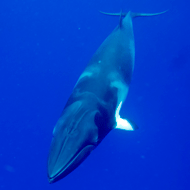Ocean sound mystery solved after decades

Scientists say their findings will improve understanding of the behaviour of minke whales.
Scientists have revealed the Antarctic minke whale is the source of a mysterious rhythmic sound recorded for decades in the southern ocean.
The unique sound was first reported in the 1960s by submarine personnel and named the "bio-duck". It has since been recorded at numerous locations in the southern ocean, but until now it's source has remained a mystery.
The sound is described as a series of pulses in a repetitive pattern. Its source was thought to be submarines, an oceanographic phenomenon or even fish.
Last February, an international team of researchers deployed acoustic tags on two Antarctic minke whales in Wilhelmina Bay, off the western Antarctic Peninsula.
Leading the data analysis was Denise Risch from the National Oceanic and Atmospheric Administration's (NOAA) Northeast Fisheries Science Center.
As well as solving a mystery, Risch says the findings have "important implications" for our understanding of the minke whale.
The sound is mainly heard during the austral winter in the southern Ocean around Antarctica and off the west coast of Australia. Experts were previously unaware that minke whales were in this area during the winter season. New findings indicate some members of the population stay in ice-covered Antarctic waters all year round, while others migrate to lower latitudes.
Acoustic tags were used for the first time on minke whales during this study. Researchers say their findings will help to improve future understanding of the species distribution, abundance and behaviour. This is "critical" for a species that lives in an environment that is difficult to access.
The research was published in Biology Letters yesterday (April 23). Authors say their findings will pave the way for further studies of the presence of minke whales in other seasons and areas.



 RCVS Knowledge has welcomed Professor Peter Cockcroft as editor-in-chief for Veterinary Evidence.
RCVS Knowledge has welcomed Professor Peter Cockcroft as editor-in-chief for Veterinary Evidence.